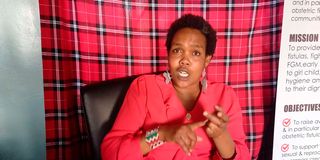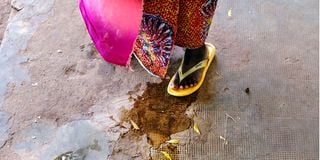"I couldn't control a fart", one woman's crusade to end fistula stigma

Nampayio Koriata, a human rights defender, fistula ambassador, an anti-FGM champion,speaks to nation.africa at her office on May 22, 2024.
What you need to know:
- Nampaiyo Koriata is a human rights defender who suffered from fistula after undergoing FGM at age 12.
- Despite the trauma, she founded an organisation to raise awareness about fistula and help other survivors access treatment.
- She has linked over 300 women for corrective surgeries and advocates against FGM, which remains highly prevalent in her community despite being illegal.
Nampaiyo Koriata is a human rights defender, fistula ambassador and an anti-female genital mutilation (FGM) champion. She is the founder, Nampaiyo Koriata Fistula Trust, an organisation based in Ololunga in Narok County, which defends the rights of girls not to be subjected to FGM, and raises awareness to young women who suffer fistula to seek treatment.
According to the World Health Organisation, FGM refers to the partial or entire removal or injury of external female genital organs for non-medical reasons. Although the practice does not provide any health benefits for girls and women, it is still widely adopted. It is estimated that 200 million girls and women alive today have undergone FGM, and 3 million girls are at risk of undergoing the procedure every year.
Just like Nampaiyo, most girls are cut before the age of 15. On November 22, 1999, Nampaiyo, then aged 12 and in Class Eight, faced the wrath of female genital cutters, and her life, as she says, ‘took a different turn’. After the cut, she was viewed as a ‘mature woman’.
“For any pastoralist girl, no matter the age, undergoing FGM automatically initiates you into womanhood. It even puts you ‘at par’ with your mother,” she says.
“All along my childhood, I had been focused on my studies, but here I was being considered ‘mature enough’ to have a boyfriend and to become a girlfriend. I then got pregnant at a young age in 2002.”
“If a man woes you to be his girlfriend and you refuse his sexual advances, other men threaten that, ‘Kama hautatobolewa kuna venye tutakutoboa’ (If you do not accept to lose your virginity, we will take it away). FGM plays a role in many cases of teenage pregnancies and early motherhood.”
In 2003, she gave birth to her first-born daughter and sustained a fistula.
“I didn’t understand what it was, but I was determined to continue with my studies, so I went back to school in 2004. Even on the day of re-admission, I soaked my pads with stool and urine.”
Psychological wellbeing
Due to the fact that Nampaiyo could not control stool and urine leakages, she suffered low self-esteem.
“I couldn’t even control a fart. I would push desks so that they produce some noise to not feel the shame that came with letting out a smelly one.”
The condition had affected her physical, emotional and psychological well-being. “I was very thin. Other people had assumed that I had another disease. But because of the fistula, I could not eat enough food to avoid having a long-call. I also could not drink enough water to avoid wetting on myself.”
There was a lot of stigma, and self-stigma too, since I couldn’t cope with such a condition, she says.
Frustrated with these challenges at school, the teen decided to have a second pregnancy. “I was hopeful that I would get married and bring to an end the struggle at school. But I still struggled with the fistula even while at home,” she recollects.
Years later, she met a suitor and got married. “We had three other children while I still had the fistula.”
In July 2015, she underwent a fistula corrective surgery at the Kenyatta National Hospital (KNH) Clinic 66.
“Due to the fistula, I frequently suffered bacterial infections. This had made my life miserable as I was always seeking treatment. After the fistula repair, I told myself that I would not keep quiet about it,” she says.

An obstetric fistula is an abnormal opening between the vagina and the bladder of rectum leading to continuous urinary or faecal incontinence.
When she informed her husband with whom they ran a non-governmental organisation that they should talk about the fistula in their programming, he was not as receptive, she alleges.
“He was like, ‘No I do not want other people to know that I married a woman who suffered fistula’. This is where my marriage started going down south and as days went by, it ended.”
I chose to talk about fistula to create awareness among women and girls, she adds.
“In 2018, when former First Lady Margaret Kenyatta visited Narok, I shared a platform with her as I talked about fistula.”
Some days later, a friend advised me to form an organisation to support women with fistula to seek medical care. That is how the Nampaiyo Koriata Fistula Trust was born, she says.
To date, Nampaiyo has linked more than 300 fistula survivors from Narok, Bomet, Kisii, Kuria and Migori for corrective surgeries in partnerships with Fistula Foundation, Kenyatta National Hospital Clinic 66, Moi Teaching and Referral Hospital, and others that offer free surgeries.
Her organisation is among those that received a grant from The Global Fund last year, to promote the health of women and girls through fistula corrective surgery.
“I am also reaching out to the Narok County Government to partner with me in raising awareness, and reaching out to women so that they can seek medical aid.
“Fistula takes away the life in a woman. You can’t go to church, attend ceremonies or even be near people. It is like you are excommunicated from community life. You can’t even have friends,” Nampaiyo explains.
“After they have the fistula corrective surgery at KNH Clinic 66, I have to orient them back to the community; to can get integrate into community social life and blend well.”
Branded a witch
Women with fistula face stigma, she says, and as a result withdraw from any social life. “I know of a case where the woman would lock herself in her house and the neighbours branded her a witch because she rarely attended community gatherings or associated with the neighbourhood. She had no friends.”
Some are chased away by their husbands. “I know of one who used to live alone in her hut and the husband enjoyed life with her co-wives. Because of her condition, she was tasked with herding livestock. At least cows and goats can’t detect stool and urine. It is sad.”
For such women, the choices are stark and miserable. “In the Maasai culture, such can’t go back to her parents’ home neither can she have her husband back.”
Nampaiyo says it takes partnerships to help grassroots women open up about their fistula journey and seek medical aid.
For some, their children intervene and re-unite them with their husbands. However, this sometimes is dangerous, as Nampaiyo narrates. “I have seen a case of a woman whose fistula was repaired successfully and her sons took her back to her husband. She had been away for over 15 years but had not completely healed. That very night, the husband insisted on intimacy and the repair tore away. I had to take her back to the hospital.”
For others, when they are discharged from hospital after fistula repairs, they have to board a motorbike to reach their home. “By the time they reach home, the stitches have come off due to the friction, push and shove on the motorbike.”
Nampaiyo has plans to set up a facility that can take care of child-birth complications, fistula repairs and fistula-related complications in Narok.
“It will be important to have a facility that takes care of women in remote villages in Narok and the far end in Isebania, and our neighbours – Kajiado and Samburu counties.”
The FGM survivor faults the recent data by the Kenya Demographic & Health Survey (KDHS) 2022, which indicated that the national prevalence of FGM is at 15 per cent.
“In Narok, I think it is over 90 per cent. I am a defender, but a girl will come to me and ask – ‘How will I stay in this community where all the girls have undergone FGM apart from myself?’ Girls are teaming up and seeking FGM services because of the stigma that comes with being uncut. A woman who has not undergone FGM is viewed as ‘immature’.
The discrimination and stigma is so pronounced such that even men who are marrying loudly announce that no ‘uncut’ woman should attend their wedding or dowry ceremony.
“This has caught some of their mothers off-guard. The mother has to undergo FGM to attend her son’s dowry or wedding ceremony. I am talking of sons who are well educated, some are professionals with university degrees,” she comments.
SIDE BAR
Obstetric fistula is treatable – Dr Khisa
Female genital fistula also known as Vesicovaginal fistula (VVF) is a birth injury caused by prolonged and obstructed labour without access to timely, quality medical treatment.
The nature of the condition varies, it manifests as an abnormal hole or opening between a woman’s birth canal and the urinary tract or the rectum causing the women inability to control urine and/or stool. An obstetric fistula is an abnormal opening between the vagina and the bladder of rectum leading to continuous urinary or faecal incontinence, says Dr Khisa Wakasiaka, obste-gynaecologist and senior fistula surgeon at KNH.
Harmful cultural practices such as FGM and teenage pregnancies also increase the susceptibility of suffering fistula. This is because adolescent mothers face a higher risk of obstructed labour as their bodies are not developed enough to undergo labour safely.
Statistics by the World Health Organisation (WHO) indicate that two women get female genital fistula per 100 births resulting in approximately 3,000 new cases annually. Of the new cases, only 7.5 per cent of the patients have access to medical and surgical treatment.
The condition is usually caused by prolonged labour when women do not have access to quality emergency obstetric care services. Left untreated, it leads to isolation, skin infections, kidney disorders and even death.
Despite the great advancement in health systems in Kenya, it is costly for women to seek fistula surgery repair. The women learn to live with the condition and resort to suffer in silence. Those who suffer obstetric fistula are often rejected by their families, religious organisations, friends, and their husbands or their partners, says Dr Khisa. This sees them lose their self-esteem and self-worth. They end up being depressed and stigmatised, he adds.
“Eliminating obstetric fistula as a global health problem necessitates scaling up country capacity to provide access to carry emergency obstetric care and treatment of fistula cases.”
KNH in partnership with the M-Pesa Foundation, Amref Health Africa, Flying Doctors Society of Africa, and Royal Media Services has been conducting free fistula corrective surgeries. A total of 45 cases were corrected through surgeries at KNH in May 2021, while in November 2022, 46 cases underwent surgical treatment at the national referral hospital.





